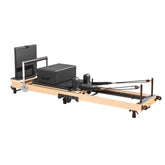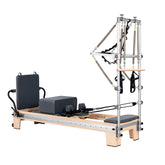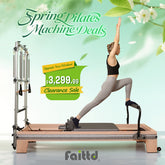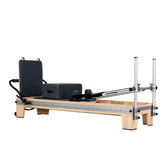Why Athletes Are Turning to Pilates Reformers for Training?
Have you ever thought about why so many athletes love Pilates reformers? With their controlled resistance from springs and pulleys, these tools are changing the way athletes train. They help you build core strength, become more flexible, and avoid injuries. For improving balance, stability, and general performance, athletes like LeBron James swear by reformer Pilates. Reformers are different from other exercise machines in that they work on underused muscles and improve balance throughout the body. Pilates is a game-changer for players, whether they want to perform at their best or avoid getting hurt.
Key Takeaways
- Pilates reformers help people get stronger in the core and keep their balance.
- These machines make muscles and joints more flexible, which lowers the risk of getting hurt.
- Reformer Pilates strengthens muscles that aren't used very often, which helps with balance and rhythm.
- Low-impact workouts on reformers help people stay healthy and avoid getting hurty.
- Reformer Pilates improves attention and body control, which is important for sports performances.
1. Core Strength and Stability
Core strength is the most important thing you can do to improve your athletic ability. Pilates reformers are a big deal in this area because they give you a new way to get stronger and more stable from the inside out.
Engaging Deep Core Muscles
The purpose of Pilates reformers is to work muscles that you might not even know you have. You work out the deep core muscles that support your spine and pelvis by focusing on controlled moves. The transverse abdominis, internal obliques, and rectus abdominis are some of these. Studies have shown that people who have done reformer Pilates before are able to engage their muscles much more than people who have never done it before. For example, the internal oblique muscle activity can increase by up to 33.35 μV during specific exercises.
Here's a quick look at how practicing makes muscle activation better:
| Muscle Group | Experienced Engagement (μV) |
| Rectus Abdominis (RPP) | 3.41 |
| Rectus Abdominis (FNP) | 3.59 |
| Internal Oblique (RPP) | 33.35 |
| Internal Oblique (FNP) | 27.87 |
This level of activation helps you build a rock-solid core, which is essential for everything from sprinting to weightlifting.
Getting Your Balance and Posture Better
Standing tall isn't the only thing that makes for good posture. How your body is aligned when you move is also important. While standard Pilates reformers provide excellent spinal support training, Pilates reformers with tower offer additional exercises to strengthen the muscles that support your spine, helping you maintain proper alignment during running, jumping, and other activities. As your core gets stronger, you'll find that your balance gets better. This means you'll have better control when moving quickly, which lowers your risk of tripping or falling.
Getting Better at Functional Movement Patterns
Functional movement is all about getting your body ready to do normal things without any problems. Because they mirror real-life movements, Pilates reformers are great at this. For instance, squats and planks on the a foldable Pilates reformer make you more stable while working out many muscle groups. This makes your moves more efficient and helps you coordinate your movements better. If you want to get in better shape or are an athlete, reformer Pilates can help. It makes your body work smarter, not harder.
2. Flexibility and Range of Motion
When you think about excelling in sports, flexibility and mobility are just as important as strength. Reformer Pilates shines in this area, helping you move freely and efficiently while reducing stiffness. Let’s explore how it can transform your body.
Making Your Joints More Flexible
Joint health is important for moving without pain. Pilates reformers are great because they allow you to do controlled, low-impact workouts that make your joints more mobile. Moving your body in ways like spine twists and leg circles keeps your joints healthy and prevents them from getting stiff. This is especially helpful for players who do the same thing over and over, like swinging a racket or running a long distance. Being able to move your joints better also makes you less likely to get hurt, which lets you play longer.
The best part is that these workouts work. They don't just feel good. When you do it regularly, it helps loosen up tight spots like your hips and lower back, which lets you move more freely. Reformer Pilates has your back (literally) whether you're recovering from an injury or trying to improve your athletic ability.
Lengthening and Strengthening Muscles
Reformer Pilates does more than just stretch your muscles; it also makes them stronger. Stretching and lifting weights together make muscles that are long and thin, as well as strong and flexible. Spine stretch forward is one way to work on your hamstrings and lower back, which can get tight from sitting or doing a lot of hard exercises.
For athletes, this mix of length and strength changes everything. You have more control over your movements and are less likely to hurt your muscles. It's also a great way to loosen up after lifting big things or playing sports with a lot of impact.
Supporting Dynamic Movements in Sports
Reformer Pilates prepares your body for the quick, dynamic movements required in sports. Dynamic moves need a strong base, which reformer Pilates gives you by working on your core and stabilizing muscles. This not only helps you do better in sports, but it also keeps your body in good shape. You'll feel more in control and be less likely to get hurt when you run, jump, or twist.

3. Injury Prevention and Recovery
Injuries can sideline even the most dedicated athletes, but reformer Pilates offers a way to stay in the game.
Low-impact, Joint-Friendly Exercises
Your joints can get hurt by high-impact workouts, especially if you work out hard. Pilates reformers are an option that is easier on the joints. The controlled, smooth moves make your knees, hips, and shoulders less stressed while still giving you a tough workout. Because of this, it's perfect for athletes who want to stay healthy without lowering their efficiency. For instance, doing movements like bridges on the reformer can help strengthen the muscles around your knees, which can make you more stable when you run or jump. These low-impact exercises are good for your joints and make you more mobile in general. It's good for your body in every way.
Strengthening Weak or Underutilized Areas
Muscle imbalances happen to all athletes. You might be stronger on one side than the other, or you might not be working out some muscles enough when you work out regularly. Reformer Pilates works on these weak or underused areas, which helps you get stronger all over.
Some exercises, like leg circles, make it easier to move your shoulders. Other exercises, like swimming, loosen up tight hip flexors that can cause lower back pain. You'll be able to move more easily and avoid overuse injuries if you work on these areas. Plus, having balanced muscles means better alignment and stance, which means you'll do better on the field or court.
Aiding Rehabilitation Through Controlled Movements
Getting better after getting hurt? Pilates reformers are a huge step forward in healing and rehab. With controlled movements, you can gently strengthen and settle hurt areas without putting them at risk of getting worse. For example, certain routines can help people with shoulder tendonitis or rotator cuff strains get their range of motion back.
- Incorporating pilates into rehab programs can decrease pain levels by 42%.
- Functional ability improves by 36% with regular practice.
Exercises like The Hundred or rollovers are particularly effective for spinal health and core strength. They not only aid recovery but also prepare your body to prevent injuries in the future. With reformer Pilates, you’ll bounce back stronger and more resilient.
4. Small Muscle Group Development
Reformer Pilates is a great way to work on these areas that you don't use enough, which will help you get stronger and more rounded.
Getting at Muscles That Aren't Being Used
Pilates reformers are made to work muscles that you might not work out as much with other exercises. Some of the muscles that will burn are your hips, hamstrings, and deep abdominal muscles. One of these is the transverse abdominis, which is very important for having a strong and stable core. Focusing on these smaller muscle groups will help you build a strong base for bigger moves.
Leg presses on the reformer are one example of a workout that works your core and glutes at the same time. This mix not only makes these muscles stronger but also makes your balance better all around. Over time, you'll be able to control and speed up your moves more easily, whether you're lifting, sprinting, or both.
Getting Better Balance and Muscle Symmetry
Muscle imbalances can hurt you and make it hard to do well. By making your muscle groups more balanced, reformer Pilates can help you with these problems. It makes weaker areas stronger and keeps dominating muscles from getting too tired. This makes the body more stable and symmetrical, which is important for sports.
Muscles that are balanced are less likely to hurt and move in the right way. Let's say one part of your body is stronger than the other. The reformer can help even things out. This not only lowers your risk of getting hurt, but it also helps you build power and keep good form while training or competing.
Helping with Overall Athletic Performance
It might not sound exciting to build small muscles, but it can make a huge difference in how well you do in sports. This makes it possible for you to move faster and more accurately. You'll also have more energy and be less tired, both of which are important for performing at your best.
Just think about it: every move you make is more successful when your body is strong and balanced. It will make a difference whether you're pivoting on the floor or swimming hard. Reformer Pilates not only makes you stronger, but it also makes you a smarter, better player.

5. Mental Focus and Body Awareness
Enhancing Mind-Body Connection
Pilates reformers do more than just strengthen your body—they also sharpen your mind. By focusing on controlled movements and breathing, you’ll develop a deeper connection between your mind and body. This connection helps you understand how your body moves, making it easier to perform complex athletic tasks with precision.
Here’s how reformer Pilates enhances this connection:
- It encourages you to concentrate on breathing and movement patterns, improving your body’s coordination.
- You’ll gain better body awareness, allowing you to adjust your form in real-time during training or competition.
- The mindful movement unites your mental and physical efforts, giving you an edge in your athletic performance.
When you practice reformer Pilates, you’re not just working out—you’re training your brain to work in harmony with your body.
Improving Concentration and Precision
Athletes know that mental focus can make or break their performance. Pilates reformers train your mind to stay engaged during every movement. You’ll learn to multitask by balancing, controlling your breath, and maintaining proper form all at once. This heightened focus translates to better precision in your sport, whether you’re aiming for a perfect golf swing or a flawless dive.
For example, exercises like the “Elephant” on the reformer require you to stabilize your core while coordinating your arms and legs. This level of concentration strengthens your mental game, helping you stay sharp under pressure. Over time, you’ll notice improved focus not just in your workouts but in other areas of life too.
Reducing Stress and Promoting Recovery
Stress can take a toll on your performance and recovery. Pilates reformers offer a way to reset both your mind and body. The slow, controlled movements shift your focus away from daily stressors, creating a calming effect. Plus, rhythmic breathing releases endorphins, boosting your mood and reducing anxiety.
Here’s a quick breakdown of the psychological benefits:
| Benefit | Description |
| Stress Reduction | Exercises help you focus on the present moment, inducing a serene mental state. |
| Improved Mood | Regular practice releases endorphins, enhancing mindfulness and self-esteem. |
| Enhanced Focus and Cognition | Controlled movements improve executive function and cognitive abilities. |
Studies show that just 60 minutes of Pilates three times a week can lower cortisol levels and improve perceived stress scores.
6. Integration with Other Training
Complementing Strength and Conditioning Programs
Adding Pilates reformers to your strength and fitness routine is a great idea. Instead of replacing traditional exercise or weightlifting, they make them better by focusing on areas that might get missed. For example, squats and deadlifts make you stronger, but footwork and leg push on a reformer make you more stable and improve your balance.
You can do reformer Pilates and power training at the same time because:
- It makes your core stronger, which is important for staying strong and stable.
- It makes you more flexible, which lets you do exercises with better form.
- It lowers your risk of injuries by encouraging good balance and alignment.
- It sharpens your mind, which helps you stay focused during hard workouts.
Supporting Cross-Training for Versatility
It's important to mix up your workouts, and Pilates reformers are a great way to do that. Whether you run, swim, or play basketball, reformer routines can help you work out muscles that your main sport might miss. For example, runners often don't work out their glutes and hip flexors, which can cause problems. Reformer Pilates makes these areas stronger, which makes your stride better and lowers your risk of getting hurt.
Here’s how it benefits cross-training:
- It builds core strength, which is crucial for maintaining alignment during any sport.
- It improves flexibility, making movements smoother and less prone to strain.
- It strengthens weak areas, like stabilizing muscles, that are often overlooked in other workouts.
Enhancing Recovery Days with Low-Impact Workouts
Recovery days are just as important as training days, and pilates reformers offer the perfect low-impact option. The controlled movements and gentle resistance help you stay active without overloading your muscles. Exercises like spinal twists or leg circles improve circulation, reduce soreness, and promote faster recovery.
Here’s why reformer Pilates is ideal for recovery:
- It focuses on controlled breathing, which calms your mind and aids muscle repair.
- It improves alignment, helping your body recover more efficiently.
- It engages multiple muscle groups without putting stress on your joints.
On your next recovery day, try a reformer session. You’ll feel refreshed, balanced, and ready to tackle your next workout.

Build Core Power Through Advanced Reformer Pilates Training
Pilates reformers give you a lot of different ways to improve your workouts. They make your core stronger, your muscles more flexible, and your small muscle groups bigger, all of which are important for top performance. Reformer Pilates aids in injury prevention and quickens healing by focusing on controlled movements. NFL stars like LeBron James have taken advantage of these advantages to stay at the top of their game. Reformers can help you create a customized training plan that fits with your current practice, whether you're recovering from an injury or just want to improve. With this game-changing tool, it's time to reach your full potential.
FAQ
Q1: What makes Pilates reformers different from traditional gym equipment?
Pilates reformers don't use weights but instead use spring tension. This lets you do controlled, low-impact moves that work on the small muscles that hold you up. Reformers are different from other gym tools because they help with flexibility, balance, and core strength while also making joints less stressed. They are great for improving efficient movement.
Q2: Can beginners use Pilates reformers?
Definitely! Beginners can use Pilates reformers. As you do easy exercises, the instructor can change the resistance. Your own speed will determine how strong and flexible you become. As a beginner in exercise, reformers are a safe and effective way to begin.
Q3: How often should athletes practice Pilates reformer workouts?
Most athletes can handle two to three practices a week. In addition to other training, this regularity doesn't cause overtraining. Maintaining your balance with your main sport-specific workouts will help your core strength, flexibility, and healing.
Q4: Do Pilates reformers help with injury recovery?
Absolutely, they're great for recovery. Low-impact, controlled moves strengthen weak spots and make joints more mobile. Specific exercises can help you recover safely and build power without hurting yourself more.
Q5: Is Pilates reformer training suitable for all sports?
Definitely! Reformers improve core stability, flexibility, and muscle balance, which benefits athletes of all sports. They're flexible enough to support players in any sport. They make it easier to move and lower your risk of breaking something.





